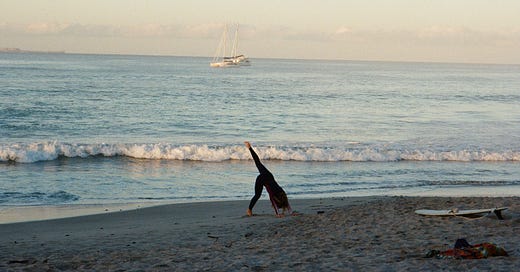On the way to Mexico people told me not to drive to Mexico at all. On the way back, people asked me why I wanted somebody in the car with me. Like it’s unsafe? Like you’re scared? No. Like I need somebody.
Taye and I drove four days through Nayarit, Jalisco, Sinaloa, Sonora, and through the less picturesque corner of the American Southwest. We drove and and it was 106 F° every day. We drove with the windows down until the wind blew out our ears. We drove using an old spray bottle of hand sanitizer full of water as a way to cool our bodies down. We drove to Mazatlán and shared the last bowl of ceviche I’ll have for a while. We drove and men with rags and squeegees cleaned the windshield every time we stopped. We drove and men with guns checked the car for plants and animals when we slowed down for speed bumps. We drove, and nothing happened to us.
This morning, Bethany Toews wrote this on her Instagram: “Florida makes me miss France. Not because it reminds me of it, but because it makes me question if I was ever there. Did I ever feel that free?” I’m back in the United States, but wondering what it would be like if I oriented myself based on my feelings instead of my location. What is a location anyway? What’s in a place? Did I really live there? What did I do? Did I do anything?
I pride myself on my capacity for finding awe in the myriad of moments spread out on Life’s Buffet, but lately sitting in the present feels wildly uncomfortable, like a stirring stomach that never flips. It feels more natural to let my mind slip into daydreams of a past that no longer exists. I wrote down an idea for a bumper sticker that read: Keep honking! I’m busy thinking about getting back together with my ex! It’s a joke, I’m telling you it’s a joke! But I do fantasize about it with frequency and for no other reason than trying to recall familiar hands in a pre-Covid era. Keep honking! I’m busy thinking about being cuddled before 2020!
I’m adjusting to a new, old reality of being back in California and without an address. For all of the moving around that I do, I can still be woefully resistant to transitional periods when I’m suspended in the in-between. Just because I’m transient doesn’t mean I don’t thrive on creature comforts or familiarity. I am softly looking for a home, but I am on the wind. I chose this life and yet right now I want everything to be old hat. I want to have been there before. I want to know the sounds of everything next door, what that stuff tastes like, I want to know exactly what he’s good for. Just because I’m transient doesn’t mean I don’t want to feel a certainty outside of myself, even just for a little while.
I wonder who in the world does not feel vulnerable right now? Where are they? What are they thinking about or working on? What are the first thoughts they have in the morning? Who takes care of them?
I once came across a man’s online dating profile that included an audio note I will never forget. This is what he said:
“I guess a fact that surprises most of my guy friends is that I don’t date, hardly at all. I’m going to bury myself here, but I don’t like dating. I hate the whole process of how awkward it is in the beginning. I just want to snap my fingers and be with the perfect woman, where everything is just perfect. I don’t like the try outs, for lack of a better word. That’s just the truth.”
I played it over and over. I laughed, I felt disdain and pity. The density! The obtuseness! But, I understood it too. Dating is hard right now. Meeting someone where they are means meeting someone where they’ve been, and right now it feels like we’ve all been through too much, too fast.
Earlier this week I reunited with my date from the last time I wrote you. We had all kinds of things planned: getting dumplings, co-working at his office together, eating an edible and laying on the floor while records played, fucking with such regularity that it impaired my ability to walk. Instead he fell ill the day of my arrival. I was already with him and, unsure if I had been exposed to Covid or not, suspended until we knew more. Oh, how I wanted to us to meet each other with vitality and vivaciousness. Oh, how much I need(ed) to rest my head in somebody’s hands, there there. But what can you do besides shift gears with grace when somebody is sick and you are likely next? I held his head in my hands instead.
They say that Libra is devoted to fairness, but I keep score more than I’d like to admit, and it doesn’t feel fair, or good. When it’s anybody else, when it’s not a man I’m letting in who gets to know about my breasts and my brother and what’s on the bedside table, I forget all about vigilance. But with potential suitors, I run a comparative tally of efforts in my head, not as a testament to keeping a healthy balance between us, but as an ineffective method of protection against being taken advantage of. It is a way of measuring and keeping track of attention, when someone’s care starts and when it stops. I should note that all of this happens automatically, it’s just something I learned how to do along the way: look for evidence that pretty soon I won’t be loved right. Artist, surfer, self-appointed scarcity detective.
This is what I’m afraid of: giving my energy, magic, woman away to the “wrong” person. But who is “wrong” in this instance? Someone who might not be able to consider me as much as I consider them right now? Someone who doesn’t see me as clearly as I’d like to be seen right now? Someone who disappoints my expectations, desires, or hopes - subjects that are ultimately my responsibility to carry anyway? Conditions make love exhausting. Conditions make love conditional. This is the world I actually want to live in: There isn’t a wrong person or a right person to give care and attention to if they need it. And the thing is, we all need it.
Something scribbled in my journal and not written by me: Resentment of others is an indication you have prioritized somebody else’s needs over your own. I think about this line often when I feel myself, for whatever reason, tapped out, unwilling to give, and acting kind of crusty about it. But what about when I want to give but am just afraid to lean into what it might require of me? Fear of giving to others is an indication that your ego is running the fucking show and is telling you a story about it not being safe to do so. Giving to another freely, wherein giving actually feels good for everybody involved, requires me to let go of every narrative besides one: Love. It requires that I be okay with things not being perfectly even and to consider that odd-ness is not an indicator that I am about to be forgotten, or worse, swindled.
It also requires me to be okay with the possibility of not being cared for the same way I care for, to accept it without defeat, and to trust that I know just what to do for myself in every situation. Recently I shared a picture of myself with my friend’s bird Piña on my head, and someone commented “but what if it poops on you?” What if? I’m afraid of the rug being pulled out from under me, but what if? Does my heart go with it? What’s leftover? Is cushy padding a pre-requisite to giving and receiving care? If so, I’m pretty sure we are totally fucked. If we wait until it is safe, secure, and cushy to give, the world will continue to dry up.
I will not calibrate my capacity to give based on what the world is doing or what’s beneath my feet. Love, even if I can’t see, taste, or touch it. Love, even if everything around me is unfolding like its antithesis. Love, even if I’m standing in the arena alone a la Brené Brown. Love, even if it is not about me. I think there is a Great Love Deficit because most of us have learned to regulate the way we engage with love to what other people are doing and how they are doing it. Is this not the definition of a dead-end relationship? Love, contingent on the wellbeing and emotional availability of humans in order to flow freely through you. What about when the average person is tired, weary, and has nothing left? Where does that leave us? Love is not just about people and what they do. Love is all around us, even if it is not about us.
It feels like there is a life spent giving freely from the root of my heart, and a life spent giving tightly, afraid of what everybody might do or not do with my offerings. There is perhaps a nice in-between that someone who doesn’t live in extremes has a better handle on. It feels like in order to truly nurture another, I must fully surrender to all possible outcomes before I can rise to the occasion. Is this what is meant by unconditional? Is this what is meant by vulnerable?
I gather I’d be less fixated on my turn to be nurtured if I wasn’t obsessed with measuring other people’s interest in me, but also if my reserves weren’t completely empty just from being alive and trying to make sense out of things. When I’m on my own, every moment feels like exhaustively carrying a steady torch of survival and avoidance, thinking my way into the next task, doing instead of being, keeping up. Must. Find. Meaning. Must. Keep. Going. But when I am comfortable, when my head is in your hands and I’m laying on my side, I can confront the futility of “trying to make sense of things” and the lack of meaning in most everything with ease, even humor. Currently, my sense of safety and comfort are dependent on co-regulating with somebody else, and I don’t care who knows it. Currently, when my head is in your hands and I am laying on my side, I have no other job but to surrender completely to this fact: everything is meaningless, besides this.
As I sat there with his head in my lap, rubbing his temples and combing my fingers through his hair, he thanked me. I thought about his reality as a Man: two jobs, a mortgage on a house under construction, co-parenting a young child with a former partner. He built a structure of All of The Things, he even arrived at them in laudable order. He is no longer a boy, just suddenly a grown up who must work tirelessly to sustain it.
“Who takes care of you?” I asked him.
“Nobody,” he replied.
There is a dogma that self-care must be routinely integrated as daily practice and not approached as a last resort, meaning an individual is not supposed to wait until they’re in crisis to start doing the things that help sustain mental health. But if an individual has reached crisis, isn’t it plausible to assume they weren’t able to help themselves to begin with? Maybe their plate was already full.
As a child, I think I was a very good adult. Alternatively, my thirties feel like the years of my life I have been the least able or willing to take care of myself. I’m doing it anyway, but I think it’s coming at a cost, and I think I’m not the only one. The expectation to be good at handling things on my own was not preceded by being taught how. It seems like there is a one-size-fits all approach to growing up in the United States. If we’re fortunate, we’re given a period of time where it’s not only accepted but expected that we are taken care of. Then we reach an arbitrary but socially obvious age that has nothing to do with what people actually need, and almost overnight we’re supposed to be sufficient at doing everything alone. Our capacity for self-reliance is equated with our maturity and reflects the integrity of our mental hygiene. Individualized care of the self is to be linear: we are expected to get better and better at it until we get very old and once again can’t do shit except shit ourselves. Until then, for half of a century, we take care of ourselves, maybe our parents, and if we want to make things harder: we add children. Perhaps we partner with someone to share the burden of life with so we can occasionally take full breaks and let others do the heavy lifting. Maybe we find ways to delegate meeting our needs to other people through an exchange of favors, or by paying them. Or maybe we fall very ill and our physical bodies change so that a doctor grants us permission to need other people.
What would it take for help to show up before anybody got sick? For help to be not only accepted but expected? Is it really as simple as asking? Much like I don’t think it’s wise to wait for a cushy green light to give love, I don’t think it’s wise to wait for people to ask for help to offer it, because they most often won’t ask. We are not taught how to take care of ourselves, we are not taught to ask for help.
Things I want to get better at saying, for me:
I want physical attention
I want mental attention
I want you to rub my forehead
I want you to read this for me
I want you to invite me to your dinner party
Things I want to get better at saying, for others:
What is an action that, when completed, would stimulate a sensation of relief in your body this week?
What are your community/friendships needing from you right now? Can I stand in for you?
What is one errand that you don’t want to do this week?
What is one email, text, or social media post you would like to write this week and can I help you?
Who do you need to express gratitude towards, and can I help you write them?
What is something you would like to try but don’t want to try alone? Can I go with you?
What day this week/month would you like company as a witness while you do mundane tasks?
Love,
Anna
A friendly reminder that my online print store is alive and thriving and would love your business.











As per usual Sis, your timing is right on. Caring takes effort, and sometimes I’m tired, but I don’t wanna be too tired to care. Thank you for this invitation to reflection ❤️ Lizey
Well this is just everything, honestly